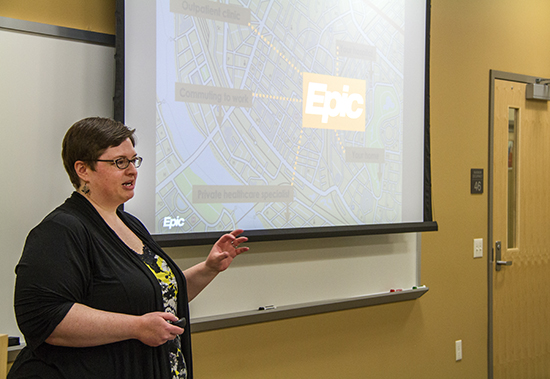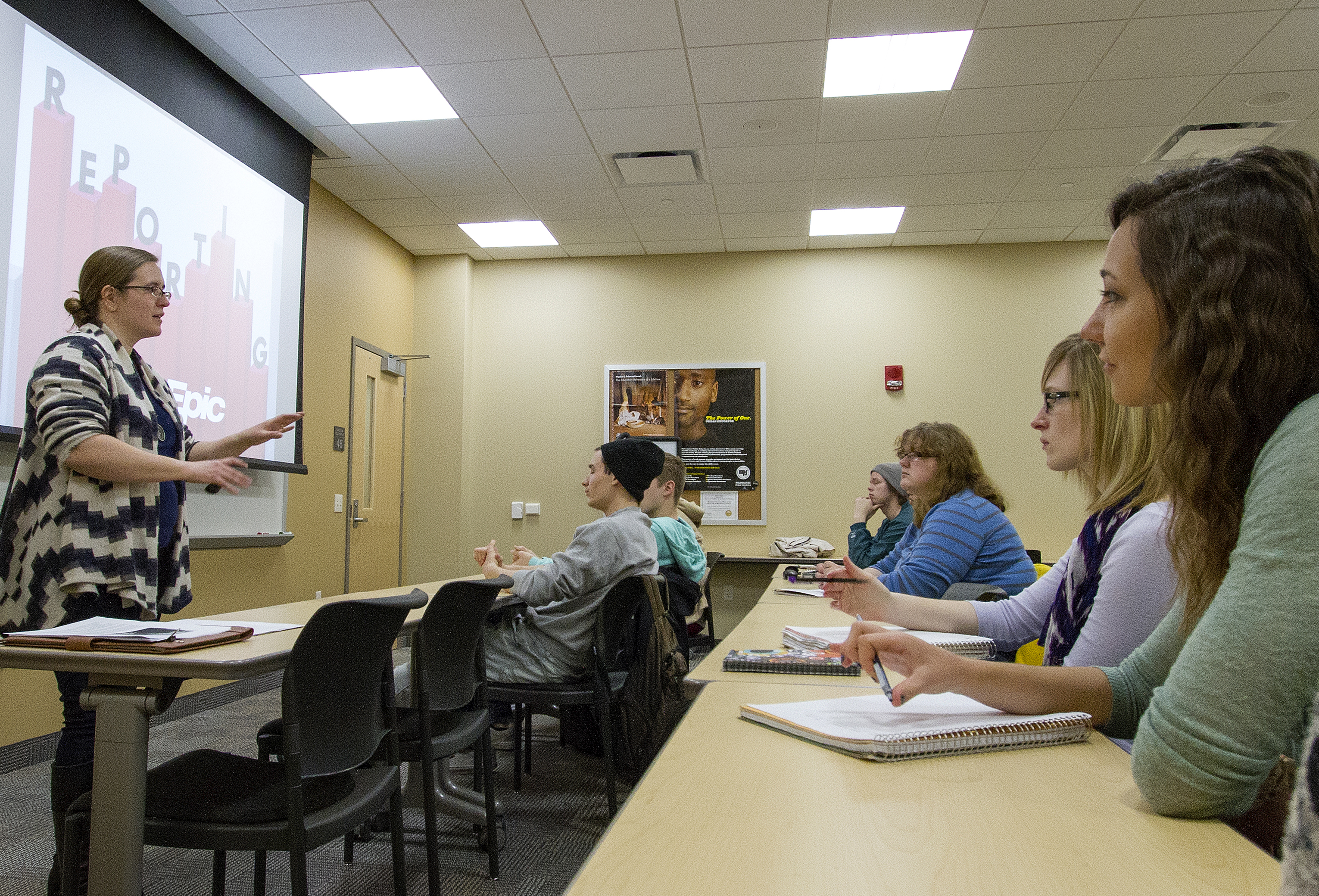Posted 6:58 p.m. Tuesday, April 23, 2013

Employees from Verona-based company speak to UW-L technical writing class about the future they found in a not-so-familiar field.
 Kaitlindh Moubry, a technical writer for Epic, talks to English Professor Marie Moeller’s technical writing class.[/caption]
Kaitlindh Moubry, a technical writer for Epic, talks to English Professor Marie Moeller’s technical writing class.[/caption]
Meshing academic, business worlds gives students a preview of future career possibilities
Celia Groff and Kaitlindh Moubry remember age 22 well. Armed with degrees in English literature and classical humanities, respectively, they didn’t know the extent of their career possibilities. The two came to a UW-La Crosse technical writing class to share the future they found in the not-so-familiar field of technical writing. Both work at Epic, a Verona-based company that develops and installs health care software. The company has grown significantly in the last 12 years and now employs nearly 120 technical writers. “Being able to write well is not a common skill these days,” notes Groff. “We wanted to let students know Epic is a potential career path because we want to attract good colleagues.” Epic employees visited English Professor Marie Moeller’s technical writing class twice during spring semester. They focused on project management, effective communication and the importance of working with and connecting to clients. [caption id="attachment_22640" align="aligncenter" width="3061"] Celia Groff, a technical writer at Epic, tells students about how her career path turned toward technical writing.[/caption]
“You get a perspective on what it’s really like after college,” explains Emily Harr, a UW-L biology major with a pre-veterinary medicine emphasis. As a future veterinarian, Harr expects to need skills like these to work with animal owners.
Groff and Moubry discussed their work process from determining the need for a project to proposing a solution. They gave tips such as the necessity of documenting questions and solutions along the way to back up decisions that have been made. They also discussed the fundamentals of a writing project such as being able to answer: “Who is reading this? “ and “What do you want them to do with the information?”
“If you’re not asking yourself those questions, you’re not doing your job,” notes Groff.
Epic approached Moeller with the idea of visiting her class. The company has a commitment to connecting with various institutions to understand potential employees and audiences for their technologies.
“As an educator, I share certain values with the organization,” says Moeller. “I especially enjoy connecting with multiple audiences and multiple locations in an effort to best educate students and myself in practices and theories in the field of technical communication.”
Moeller says she is impressed with the quality of the presentations and Epic’s holistic approach to discussing technical communication.
“It gives students a feel for the medical technology industry, and the important place of writing within that industry,” says Moeller.
Celia Groff, a technical writer at Epic, tells students about how her career path turned toward technical writing.[/caption]
“You get a perspective on what it’s really like after college,” explains Emily Harr, a UW-L biology major with a pre-veterinary medicine emphasis. As a future veterinarian, Harr expects to need skills like these to work with animal owners.
Groff and Moubry discussed their work process from determining the need for a project to proposing a solution. They gave tips such as the necessity of documenting questions and solutions along the way to back up decisions that have been made. They also discussed the fundamentals of a writing project such as being able to answer: “Who is reading this? “ and “What do you want them to do with the information?”
“If you’re not asking yourself those questions, you’re not doing your job,” notes Groff.
Epic approached Moeller with the idea of visiting her class. The company has a commitment to connecting with various institutions to understand potential employees and audiences for their technologies.
“As an educator, I share certain values with the organization,” says Moeller. “I especially enjoy connecting with multiple audiences and multiple locations in an effort to best educate students and myself in practices and theories in the field of technical communication.”
Moeller says she is impressed with the quality of the presentations and Epic’s holistic approach to discussing technical communication.
“It gives students a feel for the medical technology industry, and the important place of writing within that industry,” says Moeller.